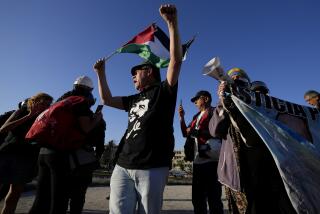Algerians Back Amnesty for Islamic Militants After Brutal Civil War
- Share via
ALGIERS — Algerians voted overwhelmingly to turn the page on a decade of brutal civil war by offering a partial amnesty to hundreds of Islamic militants, the country’s interior minister said Friday.
The conflict, which has killed 150,000 people, pitted neighbor against neighbor and isolated the oil-producing Arab state from the rest of the world amid atrocities by rebels and allegations of crimes by security forces.
Algerians approved the Charter for Peace and National Reconciliation, a personal initiative of President Abdelaziz Bouteflika, with acclaim. More than 97% of voters in Thursday’s referendum endorsed the charter, Interior Minister Yazid Zerhouni said.
The referendum’s high participation rate raised some eyebrows, particularly the nearly 72% rate in the capital, where turnout for elections is traditionally low and rarely exceeds 40%.
Zerhouni dismissed skepticism, saying at a news conference that the voting and counting were “transparent.”
The results “reflect Algerians’ desire to live in peace and to turn the page of the tragedy that our country has lived through for 15 years,” the interior minister said.
But human rights groups and some of the families of victims fear that the country’s security forces, accused of being behind thousands of disappearances, will never stand trial.
The controversial charter praised the powerful army and state agents in their fight against rebels bent on turning the North African country into a purist Islamic state. It also blamed the militants for what it called a “national tragedy.”
Some opposition parties accuse Bouteflika of planning to use the vaguely worded charter to push through laws strengthening his grip on the nation. Supporters, however, said the charter would provide a sense of closure.
France, Algeria’s former colonial ruler, saluted what it called a “democratic consultation.” The United States said that although it would have preferred a broader public debate on accountability, it would respect a referendum, which it called crucial to healing the conflict’s wounds.
“People were fed up. There were deaths every day,” said Soufi Berrezz-Allah, regional director for the newspaper La Voix de l’Oranie. “People lived in terror. We saw people decapitated; we saw their throats cut.”
The insurgency started in 1992, when the army canceled a second round of voting in Algeria’s first multiparty legislative elections to thwart a probable victory by the now-banned Islamic Salvation Front.
Frequent beheadings and massacres by Islamic extremists followed. Security forces were accused of having at least a passive role in some of the bloodshed.
More to Read
Sign up for Essential California
The most important California stories and recommendations in your inbox every morning.
You may occasionally receive promotional content from the Los Angeles Times.













